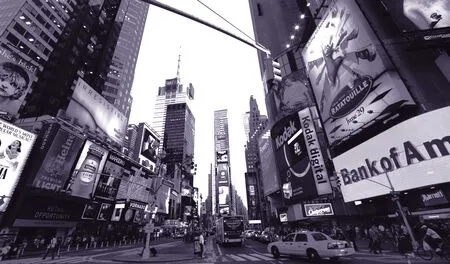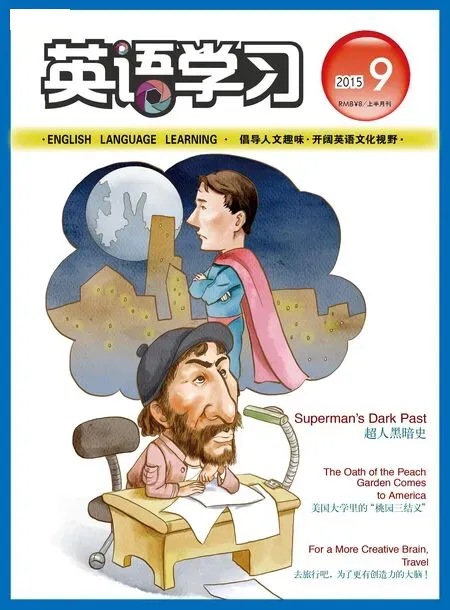When Do Advertisers Tell the Truth?
Marina Krakovsky

曾有一家市场调研机构针对受众对广告的看法进行调查:76%的受访者认为广告含有夸张的内容成分,只有3%的受访者认为广告内容是“非常准确”的。另外只有三分之一的受访者认为自己能真正看明白广告的意图。这不禁令人费解:如果大多数人不相信他们看到的内容,广告存在的意义是什么?那些成功大亨为什么争先恐后地在广告上投入大手笔?且听斯坦福大学商学院佩德罗·加尔代特教授为你一一道来。
Advertising is all around us, but a moment’s reflection1. reflection: 思考,反思。should make you wonder how it could exist at all. Think about it: Everyone knows that talk is cheap, so why would we believe a company that’s trying to sell us something? But if we won’t be swayed into buying by, say, a giant billboard or a TV commercial, then why would so many sensible and successful companies bother to advertise?2. sway: 影响(某人),使改变看法;billboard: 广告牌;sensible: 明智的,明白事理的。
Economists have been pondering this conundrum for decades.3. ponder: 思索,衡量;conundrum: 难题,难解的问题。The traditional answer, first offered by economists in the 1980s, starts with the insight that advertising isn’t exactly cheap. In many cases,the cost alone gives the ad credibility—so much so that the ad’s actual content is incidental.4. credibility: 可靠度,可信度;incidental:次要的,伴随的。The real signal of a product’s quality is in the money spent on the ad.
The implicit5. implicit: 隐含的,不言明的。message is always: “If I’m going to spend millions of dollars on an ad, it must mean I’m good,” says Pedro Gardete, a professor of marketing at Stanford Graduate School of Business. Why? Because otherwise, customers who see the ad will go check out the product, find that it fails to live up to its hype, and decide not to buy it—making the advertising investment a colossal waste of money.6. 因为如果不是这样,顾客看到广告后会去查看产品,发现根本没有广告中说得这么好,而决定不购买了——如此一来,这一广告投资便成了极大的浪费。check out:(因某人或某事物有趣或吸引人而)查看,看一看;live up to:符合,达到(高标准);hype: 天花乱坠的广告宣传;colossal: 巨大的,异常的。Consumers, the theory goes, understand all this, which is why even an ad devoid of7. devoid of: 缺乏,没有。claims can work.
But “money burning,” as economists call this costly signaling model of advertising, isn’t the only way to explain the existence of advertising or customers’ willingness to believe it.8Sometimes advertising packs a punch9. pack a punch: 击出有力的一拳,强劲有力。because of its content,not because of its cost. But sometimes an ad claiming high quality costs the same as an ad claiming low quality.
Contrary to our intuition10. intuition: 直觉。, there are times when both kinds of ads can be believed. In a 1993 paper, economists Kyle Bagwell and Garey Ramey observed that firms often have an incentive to tell the truth.11. observe: 说,评论;incentive: 动机,诱因。“They realized that the interests of the company and the interests of consumers are not always opposed,” Gardete explained. Sometimes the market just coordinates12. coordinate: 协调。—the preferences of consumers and companies match.
House hunting brings this dynamic13. dynamic: 相互作用,动态。into sharp focus.Suppose the seller says the house has four bedrooms,but there are really only two. Potential buyers of a fourbedroom home will walk away disappointed from the open house. Even worse, from the seller’s perspective, is that the seller will never reach customers in the market for a modest two-bedroom.14. perspective:(思考问题的)角度,观点;modest: 不太大的,不很贵的。“So I hurt myself two ways: I sent away customers who prefer my house, and I attracted those who on inspection don’t like the house,”says Gardete. In this idealized scenario, the market self-organizes beautifully.15. idealized: 理想化的;scenario:场景,情境。Because the buyers and sellers want each other, there’s no incentive to lie.


But what happens when the interests of the advertiser and the consumer aren’t such a perfect match? If consumer and advertiser interests match only somewhat, can advertising still be believable and provide benefits for both the firm and the consumers?
Gardete wanted to find out, so he built an economic model that treats product quality not simply as either high or low but as a continuous variable16. continuous variable: 连续变量,在一定区间内可以任意取值的变量,其数值是连续不断的。: a more realistic world with many types of companies. Gardete’s intuition had told him that in this messier17. messy: 复杂的,麻烦的,此处为比较级。world, companies would have some incentive for dishonesty—but that advertising would still work. Until he ran the model through its paces,though, he didn’t know which way companies would play their cards.18. run sth. through its paces: 使……按部就班地进行;play the cards:处理,做事。Would most exaggerate their quality, would they understate their price,or what?19. exaggerate: 夸大,夸张;understate: 少说,少报。
What he found is both reassuring and disquieting because although there remains a high level of honesty,20. reassuring: 令人安心的,令人欣慰的;disquieting: 令人不安的,使人烦恼的。some companies have an incentive to lie, and it can be hard for consumers to tell the honest sellers from the liars.
“I found that some companies with very low quality will say they’re better than they are, and they couldn’t stay in business if they didn’t overstate their quality,” Gardete says. “If people knew these sellers’true quality,” he says, “they wouldn’t even go into the store.” Once customers do get lured21. lure: 吸引,哄骗。into the store, many discover the poor quality and walk away. But enough settle for the shoddy product that it makes sense for the seller to stick with the formula.22. settle for: 满足于,勉强接受;shoddy: 劣质的,做工粗糙的;formula: 方案,方法。
Companies on the high end, in contrast, will simply tell the truth.“They have no incentive to say they’re cheaper than they are,” Gardete says, since doing so will turn away customers looking for the highest quality. Even companies offering middling quality and price tend to present themselves accurately, Gardete’s model predicts. So, even when the majority of sellers are honest, the few bad apples spoil things for many of the rest. Consumers are always worse off when advertisers misrepresent themselves.
For this reason, Gardete says some degree of truth-in-advertising regulation is necessary to protect consumers, especially when the losses from the lie are large.It’s absolutely right for the Federal Trade Commission, for example, to crack down on fraud in matters of life and limb.23. Federal Trade Commission:(美国)联邦贸易委员会,是美国保护消费者法律的联邦机构,通过消除不合理的和欺骗性的条例或规章来确保和促进市场运营的顺畅;crack down: 采取严厉措施,制裁;fraud: 欺诈,诈骗;life and limb: 生命危险。But sometimes what’s good for the consumer isn’t necessarily good for firms (who,of course, also provide social value as employers), so regulators must balance the needs of both groups. In fact, Gardete says, we as a society “might like to allow a little misrepresentation because the gains of these firms could be much bigger than the losses for consumers.”
Besides, the way Gardete’s model plays out24. play out: (事件)发生,展开。, consumers weren’t really fooled: When customers see the value-for-money ad, they understand the risk that they might go to the store and not like the advertised product. But the presence of honest sellers makes this a risk worth taking. Consumers realize there’s a chance that those pictures of the house, for example, aren’t realistic. But there’s a chance that they are,so potential buyers visit it and make sure.
Perhaps the main lesson for consumers is to take advantage of lowcost ways of gathering product information. “Unfortunately, there is an incentive for firms to misrepresent themselves, so it’s important for consumers to really use information technology, ratings and so on to make an informed decision.25. information technology: 信息技术,资讯;rating:(网络上的)点评;informed: 明智的,有根据的。”
Advertisers, for their part, can think about ads as more than a way to drum up26. drum up: 竭力争取,兜揽(生意)。sales: They’re also a way to learn about consumers, just as consumers are learning about the company. “When you’re positioning27. position: 给……定位,把……放在适当位置。your own product or company, it’s hard to know exactly what your customers want,” Gardete explains. But by putting out ads, you’re asking consumers to self-select, based on what they’re looking for, into either responding or not.28. 然而,通过投放广告,你在让顾客基于他们的需求来进行自主选择是否对广告进行回应。“By doing this, you get a chance to receive high-quality feedback from people who have at least shown an initial interest.”


